Testosterone is one of the most important hormones in the human body and plays an essential role in many aspects of health and well-being. And although this hormone is known as the ‘male hormone’, testosterone also plays an essential role in women. It not only affects sexual development and function, but also muscle mass, bone density, energy levels, mood, and much more. In this article, you will learn everything you need to know about testosterone; from production to symptoms of a deficiency or excess and you will get practical tips to keep your testosterone levels in balance. Keep reading!


What is testosterone?
Testosterone is known as the male sex hormone and is a hormone that is primarily produced in the testicles in men and in the ovaries in women. It is a hormone that is essential for the health of men and the maintenance of male characteristics, such as a deeper voice, facial and body hair, and muscle mass. Testosterone also plays an important role in the regulation of sexual functions, such as libido and obtaining an erection, and is also involved in the production of red blood cells. Although testosterone is often associated with male traits, this hormone also plays an important role in women’s health, although the amount of testosterone is much lower than in men. For example, testosterone is involved in regulating the menstrual cycle and can also impact women’s muscle mass, bone density, and sexual desire.
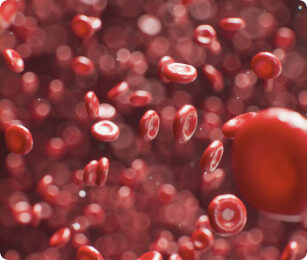


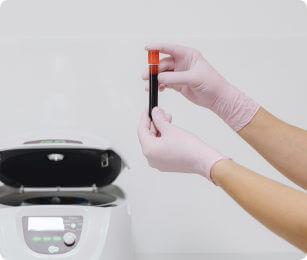
Where is testosterone produced?
Testosterone is a hormone produced in the testicles in men and in the ovaries in women. The production of testosterone in men is stimulated by hormones called luteinizing hormone (LH) and follicle-stimulating hormone (FSH), which are secreted by a structure in the brain called the pituitary gland. In women, the production of testosterone is stimulated by LH, which is secreted during ovulation. The amount of testosterone in the blood can vary depending on factors such as age, gender, and health status.
What does testosterone do to your body?
Testosterone plays an important role in both men and women. In men, testosterone is responsible for the development of male sexual characteristics such as a deeper voice, facial and body hair, and muscle mass. It also regulates sexual functions such as libido and erectile function. Testosterone is also involved in the production of red blood cells that transport oxygen to tissues and supports the growth and development of bones and muscles. In women, testosterone helps regulate the menstrual cycle and may play a role in sexual functions and muscle building.


Testosterone deficiency symptoms
Although we know that women experience hormonal fluctuations throughout their lives, it is less known that men also have changes in their hormone levels. The production of testosterone naturally decreases as men age, with an average decrease of 1-2% per year from the age of 30. Other factors that may contribute to lowered testosterone are obesity, smoking, stress, and certain medications. Avoiding these risk factors and maintaining a healthy lifestyle, such as regular exercise and a balanced diet, can help to maintain testosterone levels.
In addition, a deficiency in testosterone can also occur with specific conditions. In men, this can occur, for example, due to a congenital defect resulting in decreased testosterone production, an injury or previous surgery to the testicles, or as a side effect of medication. In women, a deficiency can occur due to surgery involving the removal of the ovaries or as a side effect of medication.
Symptoms of testosterone deficiency in men can develop gradually and are often nonspecific. The following symptoms may occur with a testosterone deficiency:
- Decreased libido, or reduced interest in sex. This is one of the most common symptoms.
- Erectile function: difficulty getting and/or maintaining an erection. This is also one of the most common symptoms.
- Fatigue
- Loss of muscle mass and strength
- Increase in body fat
- Decrease in bone density
- Reduced fertility due to decreased sperm cell production
- Mental complaints, such as sadness, depression, or insecurity.
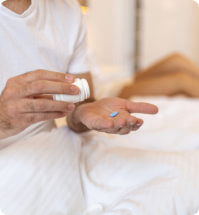


In women, a testosterone deficiency can lead to symptoms such as decreased libido, fatigue, loss of muscle mass and strength, and an increase in body fat. It can also lead to problems with the menstrual cycle.
Related tests


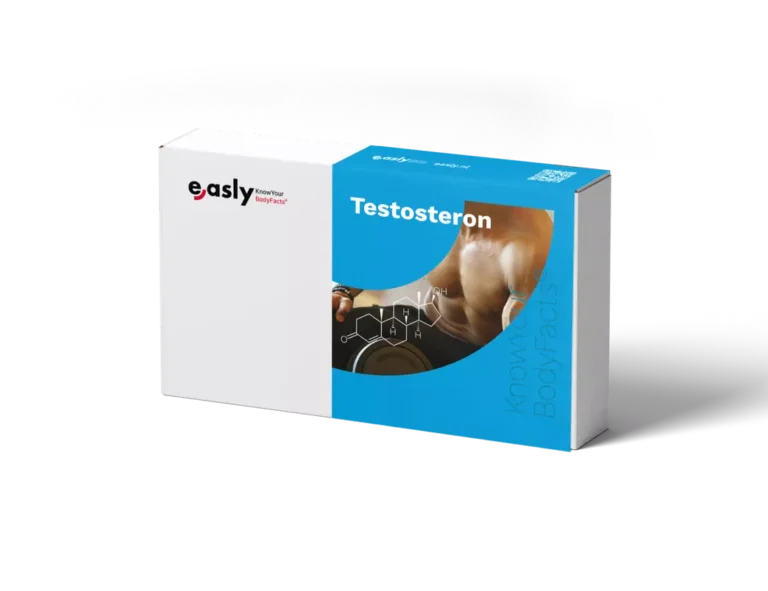
Excess testosterone symptoms
Excessive testosterone almost never occurs spontaneously. It is often caused by an external factor. The most common cause of high testosterone levels is the use of anabolic steroids. Additionally, it can occur in more exceptional situations, such as congenital conditions or a testosterone-producing tumor. In women, high testosterone levels may occur in the condition PCOS, Polycystic Ovary Syndrome. This is a common condition characterized by an irregular menstrual cycle, cysts on the ovaries, and high testosterone levels in the blood.
Symptoms in men that may indicate high testosterone levels in the blood:
- Acne
- Oily skin
- Hair loss
- Reduced sperm production
- Testicle reduction
- Anger, aggression, mood swings
- Increased muscle mass
In addition, high testosterone levels lead to reduced fertility, high blood pressure, increased cholesterol levels, and an increased risk of forming blood clots.

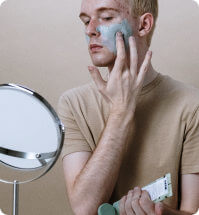

Symptoms in women that may indicate high testosterone levels in the blood:
- Acne
- Oily skin
- Increased male hairiness (for example, pubic hair, hair on the arms, facial hair, hair between the breasts)
- Irregular menstrual cycle
- Overweight
- Deeper voice
- Decreased breast size
- Reduced fertility.


Measuring testosterone in the blood
With a testosterone blood test, you can find out if your testosterone levels are at the appropriate level or if there might be a deficiency or excess. Normal testosterone levels in men depend on age.
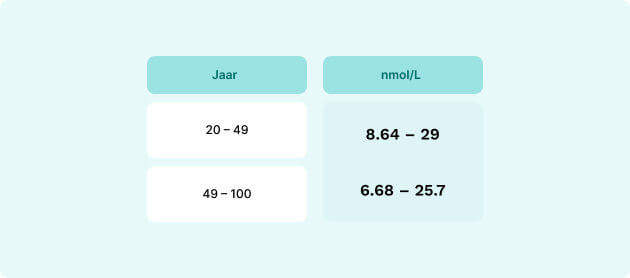
As you can see, there is a wide range in which we consider testosterone levels to be normal. This is because testosterone levels in your blood fluctuate throughout the day. The production of testosterone begins to rise early in the morning and usually peaks around mid-morning. By the evening, production decreases and reaches its lowest point around midnight. This fluctuation occurs in both men and women, although the amount of testosterone in men is much higher. In addition, women experience a higher peak just before ovulation. This fluctuation throughout the day is influenced by stress, nutrition, and physical activity in both men and women.

Are you curious if your testosterone level in your blood is normal? At Easly, you can easily test your testosterone level in a very simple way. You can do this easily at home with the testosterone test.
How do you increase testosterone?
To keep your testosterone levels healthy, it is important to pursue a healthy lifestyle. This ensures that your testosterone levels do not decrease. The following factors are very important for healthy testosterone levels:
- Getting enough sleep is important for a healthy hormone balance, including testosterone.
- Quit smoking. Nicotine decreases testosterone production. In addition, smoking increases the risk of erectile problems and decreases the quality of sperm.
- Strength training and exercise can increase testosterone levels.
- A healthy diet with enough proteins and healthy fats can contribute to a healthy testosterone level.
- Reduce your alcohol consumption. Drinking too much alcohol can lead to decreased testosterone production.
- Try to limit stress. If you experience stress often or to a great extent, try to apply stress-reducing techniques (such as mindfulness and breathing exercises).
- There are some studies indicating that sufficient vitamin D stimulates testosterone production. Vitamin D is produced under the influence of sunlight.




If there is an obvious deficiency, for example due to an underlying condition, testosterone can be supplemented. This only happens under strict supervision of a doctor, as testosterone supplementation can have many side effects. So never start testosterone supplementation without first seeking medical advice from a professional.
Conclusion
Testosterone is an important hormone for the development and maintenance of male sexual characteristics and has various effects on the body. A deficiency in testosterone can lead to symptoms such as decreased libido and fatigue, while an excess of testosterone can lead to symptoms such as acne and increased hair growth. Measuring testosterone in the blood is recommended if you experience symptoms that could potentially indicate a deficiency. Maintaining a healthy lifestyle can help keep testosterone levels healthy. However, it is important to seek medical advice before trying to artificially increase testosterone levels.
Sources:
- NHG Richtlijn – Seksuele Klachten
- Urology Care Foundation – What is low Testosterone?
- Maxima MC – Testosterontekort







